Research
Information and Society Research Division
 FURUKAWA Masako
FURUKAWA MasakoInformation and Society Research Division, Associate Professor
Introduction
Learning Analysis for Learning that Fits You Best
Studying and learning while connected to the Internet from a computer or mobile phone is called "e-learning." With e-learning, a server maintains records called learning logs that track when, where, what, and how the learner learns. Data like this related to education accumulates continually. There's so much of this data now that there's a term for it--it's called educational big data. Learning analysis is a part of this field. It consists of analyzing learning logs to clarify learning behavior. It's drawn considerable attention, particularly in the U.S. and Europe. I'm involved in learning analysis with the ultimate goal of providing individualized learning support for learners.
Learned Necessity of Learning Analysis When Creating Teaching Materials
In a previous job, I created teaching materials for e-learning programs that taught Japanese to non-native speakers. Acquiring Japanese language skills is a key issue for foreigners living in Japan. Everyone's different in terms of difficulties and weaknesses, so, ideally, the best thing would be to teach people in ways that match their specific needs. But this wasn't possible. Instead, I tried to create teaching materials that would allow learners to efficiently acquire necessary Japanese language skills.
Learning a language involves the acquisition of four basic skills: reading, writing, listening, and speaking. To acquire speaking skills, for example, it would be really convenient if you could know right away whether what you said was correct or not. I developed a function that imports words spoken using voice recognition and displays them in hiragana. I also added a function that automatically creates term lists only for words that the person tends to struggle with, based on their learning logs. These functions come from an effort to accommodate individual learners. This experience taught me about the process of creating teaching materials and the difficulties involved.
At the same time, while creating these teaching materials, I developed an interest in figuring out how the functions we designed and created were being used and whether they had the desired results in terms of learning. Learning analysis, which can also provide hints for improving teaching materials, provides the answer. Until recently, expert teachers created and evaluated teaching materials by drawing on their own experience. Now that this process is driven by data, we're more likely to be able to clarify bases for decisions and effectiveness in promoting learning.
What Learning Analysis Can Do
Learning analysis provides information for improving teaching materials. Moreover, analyzing information from individual learners makes it possible to identify the teaching materials that are a good match for a particular person and learning status, for example, whether the person might be falling behind others. Grouping learners also clarifies their tendencies. This information can be obtained whenever it's needed,which makes it possible to adopt in a flexible way to learners based on their learning behavior. Learning analysis appears set to become an important tool for everyone involved in education.
Building Bridges between Big Data and Users
Together with a college that hosts online educational programs, I'm currently building a database for storing server-based learning logs. When it's complete, this database will house learning logs in the form of teaching materials, video viewing records, and test results, and I'll make proposals about what valuable information we can identify from what types of learning log analysis. This will make it possible to bridge for the first time the gap between educational big data and the people who use the data. That's the motivation for this research.
Many different people are involved in learning analysis, and the usefulness of learning analysis varies to the same extent. But finding out more precisely what educational big data can do will take some more time. I plan to make this a sustained initiative that also targets discovering the true value of learning analysis.

 Summary of NII 2024
Summary of NII 2024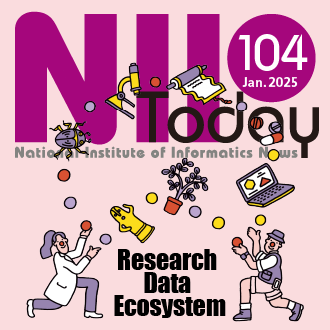 NII Today No.104(EN)
NII Today No.104(EN) NII Today No.103(EN)
NII Today No.103(EN)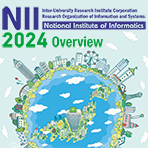 Overview of NII 2024
Overview of NII 2024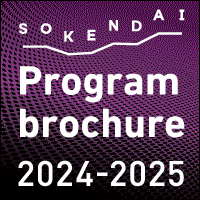 Guidance of Informatics Program, SOKENDAI 24-25
Guidance of Informatics Program, SOKENDAI 24-25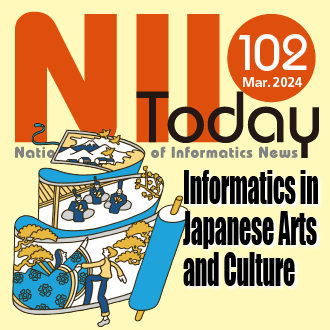 NII Today No.102(EN)
NII Today No.102(EN) SINETStream Use Case: Mobile Animal Laboratory [Bio-Innovation Research Center, Tokushima Univ.]
SINETStream Use Case: Mobile Animal Laboratory [Bio-Innovation Research Center, Tokushima Univ.]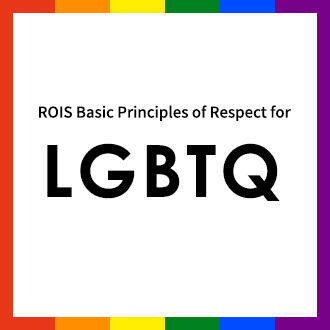 The National Institute of Information Basic Principles of Respect for LGBTQ
The National Institute of Information Basic Principles of Respect for LGBTQ DAAD
DAAD
